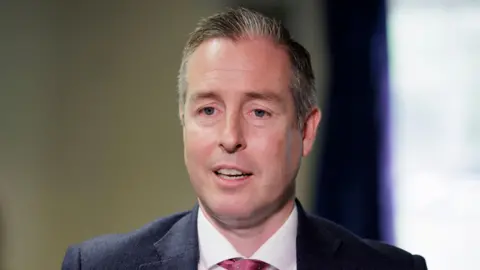'No parent wants to send their child to a school that does not want them'
 BBC
BBCA woman whose child has special educational needs (SEN) has said "no parent wants to send their child to a school that does not want them".
Emma Morgan, of SEN Reform NI, made her comments after the Education Authority (EA) said it is considering an unprecedented move to instruct some schools to enrol SEN children.
Chief Executive Richard Pengelly said the shortfall of SEN places for September 2025 constitutes a "crisis".
In a letter to principals, seen by the BBC, Mr Pengelly said he estimates 164 children will not have a place in school in September.
Speaking to BBC Radio Ulster's Evening Extra programme, Ms Morgan, whose son Tom is autistic, said: "One of the most important things for children is a sense of belonging in their school, that they feel they are wanted, appreciated and valued."
 UK Covid Inquiry
UK Covid Inquiry'We should not need to do this'
Mr Pengelly said 27 specialist provision classes would need to be created to deal with the enrolment crisis, adding it was an unacceptable position for those children and their parents or carers.
He said that "if voluntary efforts prove insufficient", the EA must also consider asking the Department of Education to "consider a process to formally instruct specific schools with available capacity to establish provisions".
In the letter Mr Pengelly said it would be with a "heavy heart" for the EA to take this step and "would also not reflect well on our sector as a whole – simply put, we should not need to do this".
But added it would be "preferable" to leaving vulnerable children without a school place and leaving families in "avoidable uncertainty and distress".
'There is more to this issue than finding classrooms'
Ms Morgan said she understands why the EA needs to take this step "because all schools have a responsibility to teach children with SEN".
However, she said there are children at the more complex end of SEN who "need specific support that may not be able to be met" in mainstream schools.
"It's not just a case of bums on seat in a school, finding a seat for a child in a classroom. There is more to this issue than finding classrooms. It is finding the right classroom, with the right people, in the right environment and a school that wants them, more than anything," Ms Morgan said.
She added: "I don't want to, and no parent wants to send their child to a school that does not want them.
"If we are going to be sending children to a school that does not want them, we need to find out why that school does not want them, see if we can help support the school and make sure that they feel confident bringing our children into their schools.
"There is probably a reason why a school does not want to open a specialist unit and we need to be looking at that in depth rather than sending a letter out forcing schools to take children with complex needs.
"It is not appropriate and we need to think of the bigger picture, holistically, about how to educate our children."
 Getty Images
Getty ImagesThe EA identified 58 schools in locations facing pressure for schools spaces that would be able to enrol SEN pupils.
The Education Minister and the EA wrote to these schools requesting support.
"Despite numerous engagements by EA colleagues, and the Minister taking the unusual step of writing directly requesting their support, unfortunately only one school has responded with a firm offer to progress work for September 2025," Mr Pengelly said.
The EA Chief Executive has appealed again for more schools to come forward, stating the EA "fully acknowledge the pressures schools are facing" but in order to deal with the lack of spaces for SEN children before September 2025, he "urgently appeal to those schools to whom we have written to work collaboratively with us".
He went on to say that the EA and the department "cannot afford to fail" and "we must continue to strive ensure that every child receives the high-quality education and support they deserve".
 PA Media
PA Media'A failure of government'
The school leaders' union NAHT NI has hit out at what it says is an "unacceptable" move to shift blame onto schools for the shortage of SEN placements.
Dr Graham Gault, the union's national secretary, said "this is not a failure of schools", adding: "This is a failure of government and system leadership."
"We have heard directly from school leaders across Northern Ireland who have said 'no', not from unwillingness, but from real and urgent concerns," Dr Gault said.
"These include concerns over their ability to ensure pupil and staff safety, deliver full access to the curriculum, and a lack of adequate training and resources to support children's additional needs effectively."
He added that it is "simply unacceptable" to "attempt to shift both the burden and the blame onto schools that are already operating beyond capacity".
The union is calling for "immediate and meaningful" collaboration between the Department of Education, the Education Authority and school leaders.
There are about 70,000 SEN students in Northern Ireland and 29,000 of them have an official statement outlining the support they need.
Currently, a child can receive a statement of SEN, which is a legal document setting out the support they should receive, in school.
